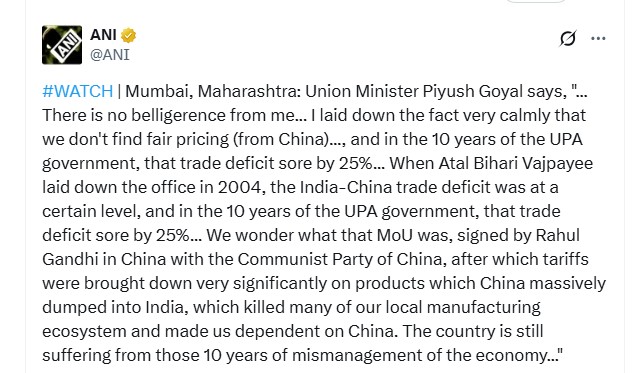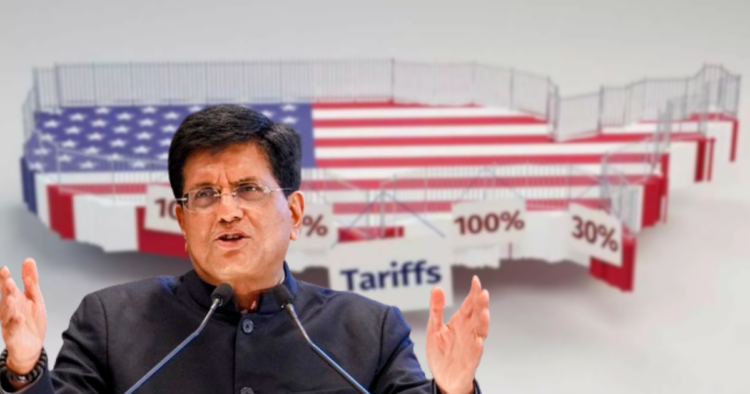KEY POINTS
- Piyush Goyal is hopeful that the new US tariffs could help India’s industries find opportunities, despite global market uncertainty
- Goyal criticized China for unfair trade practices and said India is struggling with the economic effects of the previous government’s policies
- Goyal criticized China for unfair trade practices and said India is struggling with the economic effects of the previous government’s policies
Union Minister for Commerce and Industry, Piyush Goyal, expressed hope that the recent tariff announcements by U.S. President Donald Trump could benefit India’s industries, even though the global market is uncertain.
Speaking at FICCI’s 98th Foundation Day, Goyal mentioned that different industries have different views on the situation, but he is in touch with them to understand their concerns. He believes that India will find opportunities in these changes and that the country can gain from it.
Goyal also praised India’s growing startup ecosystem under Prime Minister Narendra Modi’s leadership. He shared that since the “Startup India” movement started 9 years ago, the number of startups in India has risen from 400 to more than 170,000, which he called a source of pride for the country.
Piyush Goyal Takes Aim At China On Trade
Union Commerce Minister Piyush Goyal accused China of unfair trade practices that have helped its economy grow. He said China’s growth is based on distorted pricing, unclear subsidies, and labor practices that don’t follow global trade rules. Goyal pointed out that China doesn’t offer fair prices, and he stressed the need for reforms to make international trade fairer, especially with the current stock market problems.
His comments come as tensions between China and the U.S. are affecting global markets. Goyal expressed concern that China’s growing influence in global trade is hurting countries like India. He warned that without changes to fix these trade imbalances, the world could face more economic problems.
Goyal also mentioned that the trade gap with China grew a lot during the United Progressive Alliance (UPA) government. He said that when Atal Bihari Vajpayee left office in 2004, the India-China trade deficit was at a certain level, but during the 10 years of the UPA government, it increased by 25 times.

Piyush Goyal also raised concerns about a memorandum of understanding (MoU) that Rahul Gandhi signed with the Communist Party of China. Goyal claimed that the agreement led to a reduction in tariffs on Chinese products, which were then dumped into the Indian market.
He said, “We wonder what that MoU was, signed by Rahul Gandhi in China with the Communist Party of China, after which tariffs were lowered significantly on products which China flooded into India.” Goyal added that this hurt India’s local industries and made the country more dependent on China.
The Union Minister also criticized the long-term effects of these decisions, saying that India is still struggling with the economic problems caused by the policies of the previous UPA government. “The country is still suffering from those 10 years of mismanagement of the economy,” he said.
These comments come during a time when Chinese markets are facing a major downturn, with Hong Kong’s Hang Seng Index falling by 13.2 %, the largest drop since 1997. Chinese markets are facing more challenges as China imposed its own tariffs in response to U.S. trade levies, raising fears of a trade war that could harm the global economy.
Amid rising pressure on global stock markets, U.S. President Donald Trump downplayed concerns about inflation, claiming that the tariffs were bringing in billions of dollars each week. He accused past U.S. governments of letting countries like China take advantage of American markets. “China is the biggest abuser of them all,” he said, adding that China’s markets were “crashing.”
To make matters worse, Trump warned China to remove its retaliatory tariffs or face additional tariffs of 50 % starting April 9. He also said that if China goes ahead with a plan to impose a 34 % tariff on U.S. goods, he would end talks with them. Trump extended this warning to other countries planning to respond to new U.S. tariffs set to begin later this week.

















Comments